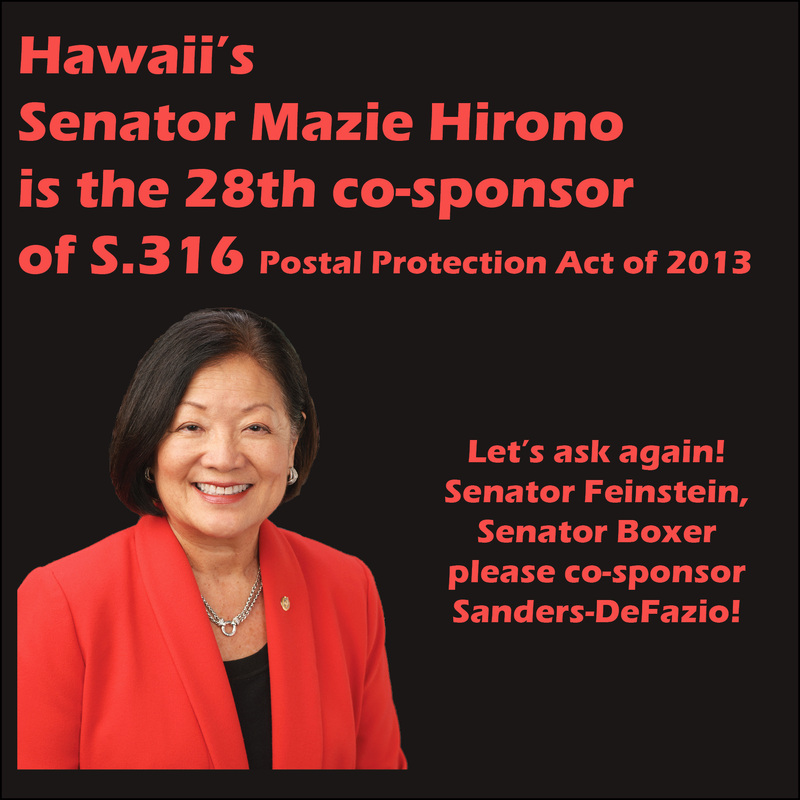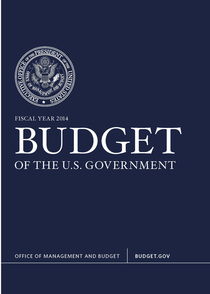If you are opposed to the sale of America's historic post offices, please ask our elected federal officials to take action.
President Barack Obama

Write or call the President:
The White House 1600 Pennsylvania Ave NW Washington DC 2500 Phone: (202) 456-1111 (Comments) Switchboard: (202) 456-1414 TTY/TDD: (202) 456-6213 Email the President |
Senator Barbara Boxer

Washington DC Office:
112 Hart Senate Office Building Washington, D.C. 20510 (202) 224-3553 Oakland Office: 70 Washington Street, Suite 203 Oakland, CA 94607 (510) 286-8537 (202) 224-0454 fax Email Senator Boxer Click for a sample letter to Senator Boxer |
Senator Dianne Feinstein

Washington DC Office:
331 Hart Senate Office Bldg. Washington, D.C. 20510 Phone: (202) 224-3841 Fax: (202) 228-3954 TTY/TDD: (202) 224-2501 San Francisco Office: One Post Street Suite 2450 San Francisco, CA 94104 Phone: (415) 393-0707 Fax: (415) 393-0710 Email Senator Feinstein Click for a sample letter to Senator Feinstein |
Congresswoman Barbara Lee

Washington DC Office:
2267 Rayburn HOB Washington, DC 20515 Phone: (202) 225-2661 Fax: (202) 225-9817 Oakland Office: 1301 Clay Street Suite 1000-N Oakland, CA 94612 Phone: (510) 763-0370 Fax: (510) 763-6538 Email Congresswoman Lee |
USPS Governance and Oversight
Find out about our public servants who are members of the USPS Board of Governors, the Postal Regulatory Commission, and the House and Senate Committees that exercise oversight on postal service operations. Click to view or download our Guide to USPS Governance and Oversight.
|
|
June 19th Update on the Postal Service Protection Act of 2013S.316 is the legislation introduced by Vermont Senator Bernie Sanders to fix the manufactured USPS financial crisis. Twenty-eight senators have signed on as co-sponsors. H.R.630 is similar legislation introduced in the House by Oregon Congressman Pete DeFazio. It now has 162 co-sponsors. But the question is: How many co-sponsors does it take before Darrell Issa's committee will actually begin discussion of this legislation, let alone send it to the House floor for a vote?
Click to view or download a list of the twenty-eight senators and thirty-one California congressional representatives who have endorsed this progressive legislation. When we first starting following these bills back on March 11th, DeFazio's bill had 31 co-sponsors. Now there are 162 including thirty-one California congressional representatives who have endorsed H.R.630. George Miller and Nancy Pelosi are the Bay Area members of the twenty-two California congressional representatives who have yet to sign on as co-sponsors. H.R.630 has seven Republican co-sponsors and 155 Democrats. Why is it that one man, California's Darrell Issa, can keep this bill from having even a hearing? And what will it take to get Speaker John Boehner to bring this bill to the House floor? On March 28th when we first reported on the Sanders' bill there were only twelve Senators who had signed on. Now there are twenty-eight. We have met with representatives of Senators Boxer and Feinstein to present your letters and we continue to ask when California's senators will endorse S.316 and take action to protect our historic post offices. |
Sign Congressman Peter DeFazio's petition to the White House
It only takes a moment to sign up on the White House site. Over 28,000 people have already signed Oregon Congressman Pete DeFazio's petition. Join them!
If the petition receives a total of 100,000 signatures by May 24, 2013, the White House will formally reply. Twenty-five Senators and 152 members of the House are sponsoring these bills to put the Postal Service back on a solid financial footing. Join in petitioning the Obama Administration to: Save the Postal Service-Save American Jobs. About 80% of USPS financial losses since 2007 are due to a Congressional mandate to prefund 75 years of future retiree health benefits over 10 years. In 2012 USPS lost a record $15.9 billion, but $11.1 billion of that loss went to prefund healthcare. This must change.
Sign the petition! |
White House Budget for FY 2014 gives USPS authority to go
|




